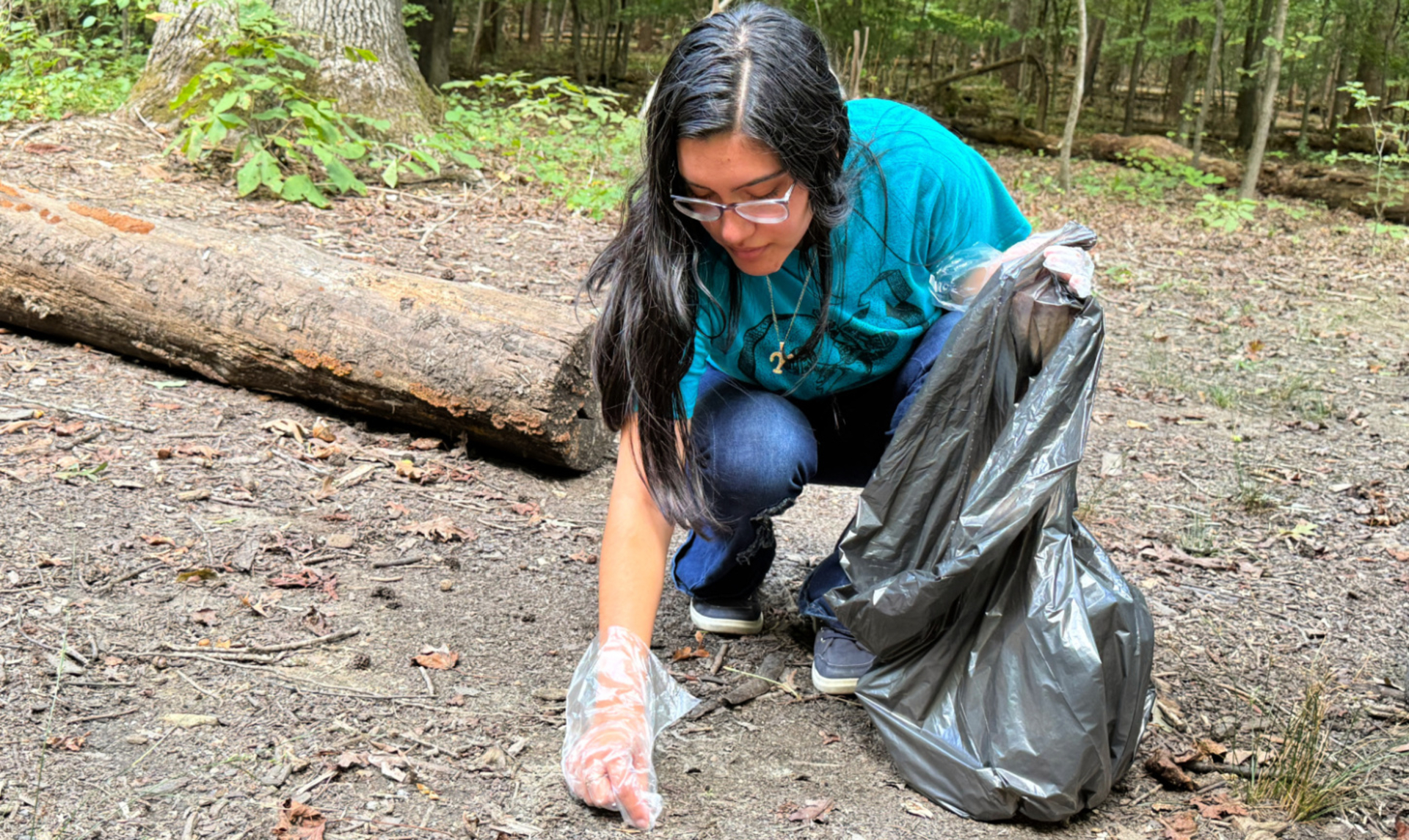
Yairin Cruz '26 was one of a dozen Guilford students who helped clean Guilford Woods this month as part of a class on peacebuilding.
A woods clean-up offers hands-on training in sustainable peacebuilding. Students practice relationship-centered change by collaborating with classmates, while examining personal habits, cultural norms and structural gaps that contribute to environmental harm.
“It showed how important it is for all of us to talk and understand each other. Not just in cleaning up, but in understanding how it happened in the first place and what we can do to prevent it later.”
On a late-summer afternoon last week, a handful of Guilford students fanned out through Guilford Woods, gloved hands lifting discarded bottles, food wrappers and other litter. The project was more than a clean-up — it was a living lesson in the College’s “Peacebuilding in Divided Societies” course, where understanding conflict means rolling up sleeves and working toward reconciliation with both people and the planet.
Zulfiya Tursunova, Associate Professor and chair of the Department of Peace and Conflict Studies, says a woods clean-up offers hands-on training in sustainable peacebuilding. Students practice relationship-centered change by collaborating with classmates, community members and the natural world while examining personal habits, cultural norms and structural gaps that contribute to environmental harm.
“What we are trying to do is look at approaches and strategies for peacebuilding in the context of deeply rooted, divided societies — and how we can identify the challenges but, more importantly, transition to sustainable peace,” Zulfiya explains.
Yairin Cruz ’26 had only visited Guilford Woods once before. She was surprised by how much litter the class removed — and how much the experience brought them together. “It showed how important it is for all of us to talk and understand each other,” she says. “Not just in cleaning up, but in understanding how it happened in the first place and what we can do to prevent it later.”
That reflection is central to the course, Zulfiya says. “Students develop a clear theory of change, linking immediate results — bags of collected trash — to longer-term goals like shared stewardship and reduced conflict over resources. A project like this models the restorative work of repairing damage and building trust, showing that lasting peace grows from small, collective acts of care.”
Foundations of peacebuilding
The class deepens students’ understanding of the theological foundations of peacebuilding while comparing faith-based approaches with conflict management, settlement, prevention, resolution and transformation. Rather than rely on lectures alone, Zulfiya asks students to design local projects that address “social change, liberation, and community-based peace building.”
“Looking at environmental peacebuilding is important for us,” she adds. “Building peace with Mother Earth is critical for moving forward and finding creative approaches to problem solving.”
The course is intentionally reflective. Students draft proposals exploring theories of change and the personal, cultural, structural and relational dimensions of conflict. Their work unfolds in three phases — proposal, implementation and synthesis. During the final stage, students evaluate their projects using nine criteria, from strategic alignment with Guilford’s mission to impact assessment. “They identify their own indicators, measure them, and decide if something is missing,” Zulfiya says.
With students majoring in fields from Health and Sport Studies to Business and Economics, the class benefits from diverse perspectives. While the woods clean-up had no financial cost, Zulfiya notes the “human cost” — time, energy, collaboration — was a key part of the learning. Students even contacted local stakeholders, including the City of Greensboro’s environmental department, to discuss long-term sustainability.
“They see the importance of having more long-term projects in Guilford Woods,” Zulfiya says. Students suggested adding recycling bins and posting reminders to use reusable water bottles to curb litter in the future.
For Zulfiya, the lessons extend well beyond the woods. “Many of them will be working in nonprofits, government or starting their own businesses,” she says. “This is an important skill. It’s hands-on and reflective — about how we can build relationships with nature in a more humane way.”
Interested in learning by doing?
Join Guilford’s Peace and Conflict Studies community and explore courses like "Peacebuilding in Divided Societies." Email admission@guilford.edu or contact Steve Mencarini to explore the admission process.

